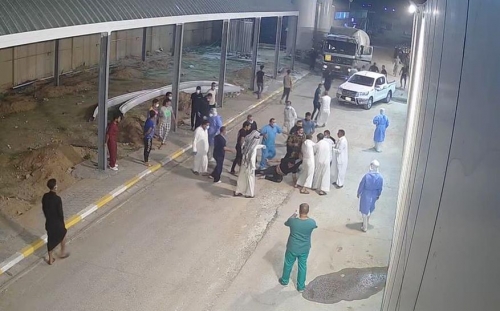“Every time a patient dies, we hold our breath”
Najaf, Iraq
Iraqi doctor Tariq Al-Sheibani remembers little else beyond cowering on the ground as a dozen relatives of a patient, who had just died of COVID-19, beat him unconscious. About two hours later the 47-year-old director of Al-Amal Hospital in the southern city of Najaf woke up in a different clinic with bruises all over his body.
“All the doctors are scared,” said Sheibani, speaking at his home in Kufa a few weeks after the Aug. 28 attack. “Every time a patient dies, we all hold our breath.” He is one of many doctors struggling to do their job as COVID-19 cases rise sharply in Iraq.
They are working within a health service that has been left to decay through years of civil conflict and underfunding, and now face the added threat of physical attack by grieving and desperate families. We spoke to seven doctors, including the head of Iraq’s Medical Association, who described a growing pattern of assaults on the medical staff.
Dozens have taken place since the COVID-19 pandemic began. Meanwhile, the United Nations has warned that the pandemic could spiral out of control in Iraq. Authorities have lifted many lockdown measures, allowing restaurants and places of worship to reopen, but they have shut borders to pilgrims ahead of a large Shia pilgrimage that normally draws millions to the south of the country.
Iraq has recorded several thousand new coronavirus infections every day, and the total now exceeds 300,000. More than 8,000 people have died, a number that some doctors fear will rise sharply, putting frontline healthcare workers under huge pressure and in some cases in physical danger.
The health ministry did not immediately respond to a request for comment on the COVID situation in Iraq and medics’ complaints about the threat of violence. ‘I hate myself’ Sheibani, whose beating went viral when CCTV footage circulated online, said the family of the deceased patient blamed his staff for the death. He said he did not know how the video reached the public domain.
The patient had arrived at the hospital in critical condition. “I hate myself and I hate the day I became a doctor in Iraq,” Sheibani said. “They brought the patient in his final stages and he died, and they want the health system to bear the responsibility.”
Enforcing health safety guidelines within the hospital is not always easy, especially when tensions between families of sick patients and hospital staff are running high. During a recent visit to Sheibani’s hospital, which is a coronavirus isolation center, reporters saw relatives of COVID-19 patients coming in and out of the ward without wearing full protective gear as they are supposed to.
Some were only wearing surgical face masks. Iraq is fighting the pandemic with a depleted force of doctors and nurses. In 2018, it had just 2.1 nurses and midwives per thousand people, compared with Jordan’s 3.2 and Lebanon’s 3.7, according to official estimates. It had 0.83 doctors per thousand people, while neighboring Jordan, for example, had 2.3.
There are also significant shortages of drugs, oxygen, and vital medical equipment, the result of years of underspending. Many young doctors say they are overworked, putting in 12-16 hour shifts every day meaning they are more likely to make mistakes in prescriptions and treatment. Some take kickbacks for handing over certain drugs, physicians told Reuters. The Health Ministry did not immediately respond to a request for comment.
Related Posts

